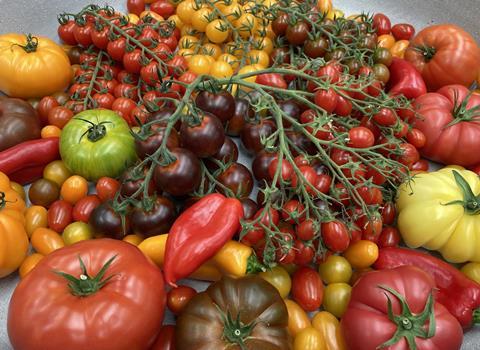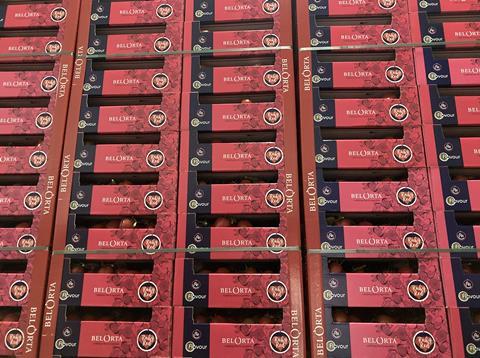Global instability is encouraging Belgian suppliers to stay close to home when it comes to strawberry and tomato exports, with the UK remaining a key destination despite the post-Brexit uncertainty

The sense of trepidation provoked across the world by US president Donald Trump’s trade wars will be a familiar feeling for many Belgian fruit and vegetable suppliers, whose principal market vanished in a flash when Russia’s embargo was introduced back in 2014. That particular bombshell precipitated a concerted effort to find new export markets to replace the sizeable volumes of Belgian produce formerly sent to Russia. Some Belgian companies had been looking at opportunities in the US for Brussels sprouts, endives and bell peppers, but the US continues to represent just a fraction of Belgian exports.
The UK’s decision to leave the EU has presented more of an imminent threat, with continued uncertainty over whether the smooth flow of goods across the Channel would prevail. The recent EU-UK deal looks likely to ease those fears, but given global uncertainties, most Belgian suppliers are currently focused on Europe.
“Stability is so important,” says Veerle Van Der Sypt, secretary general of Fresh Trade Belgium. “You need to know what to expect and which direction to follow. With everything that is going on, we see that operators are again more focused on the safe markets, like within the EU and to the UK. We do have stable exports of pears to China, for instance, and these will continue, but there’s a feeling that it’s not really the time for too much adventurousness.”
Jan Engelen of Hoogstraten confirms the cooperative, which specialises in tomatoes, peppers and strawberries, has elected to focus on Europe for the time being. “That of course includes the UK,” he clarifies. “Our exports to the UK are quite strong during certain periods of the year, even bigger after Brexit than before, not only for strawberries but also in specialty tomatoes. Much depends on border controls, as we’re talking about very perishable products, so they need to go as quickly as possible. But up until now, it’s been going quite well.”
Brand recognition
The month of May featured the annual Week of Hoogstraten promotional campaign, with actions in retail, on social media, radio and TV. “The promotion is focused on Belgian consumers,” says Engelen, “but we are doing more and more in the Netherlands, since we share a language. With social media, it’s now much easier and cheaper to promote in our other export markets, so we are doing something in Norway, France and the UK.”

The limiting factor in the UK is the preponderance of retailers’ own private labels. What’s the sense of putting all the effort into marketing if the consumer doesn’t see the brand? “In the UK, it’s a little bit harder, because a lot of our strawberries are sold as private label, so you can only see the Hoogstraten brand when you go to the wholesale markets and specialist shops,” he explains. “So we have to target people from restaurants and foodservice, but that’s easier with social media. There are some fruit brands on the UK market like Zespri and Pink Lady, and we aim to become one of these.”
Belgian tomato grower Krikato’s Ruby Red, remarkable for its deep red colour both inside and out, isn’t sold everywhere — and that’s by design. “We want to keep it exclusive,” says the company’s Kris De Weerdt. “You won’t see it under a supermarket’s own brand. If a retailer wants to stock it, it must be in the Ruby Red packaging. That helps preserve the brand.”
The company’s cautious expansion and refusal to compromise on quality has helped Ruby Red gain a loyal following. “It’s not about producing the most,” says De Weerdt. “It’s about producing something people remember and come back for. We want to keep the acreage limited. If everyone grows Ruby Red, the market would flood and prices would drop. We’re focused on keeping it premium. If demand increases, we’ll scale, but carefully.”
Roughly 60 per cent of Krikato’s Ruby Red tomatoes are exported, with 30–35 per cent destined for the UK, largely through independent retailers and wholesalers. “They like it for the taste, colour, and good shelf-life,” says De Weerdt. “It arrives looking beautiful and tastes great.”
Price transparency
Krikato is part of the BelOrta cooperative, which represents over 1,000 growers from across Belgium and the Netherlands, with a portfolio of more than 170 products. “If it can be grown in Belgium, chances are we sell it,” confirms the cooperative’s Glenn Philips.
At the heart of BelOrta’s operations lies its auction system, a model that not only ensures pricing transparency but also protects growers from destructive undercutting. “In the old days, traders would play growers against each other, driving prices down,” Philips says. “The auction clock changed everything. Now we standardise quality into blocks, so buyers know exactly what they’re getting, and growers can focus on farming, not haggling.”
Most produce sold through the clock is unprocessed—loose in crates and headed to supermarket buyers or exporters who arrange their own packaging. However, BelOrta has dedicated teams to label, seal and repack to customer specifications when requested. “Supermarkets usually handle packaging, but we provide the service when needed. It keeps the flow fast and efficient.”
The auction clock continues to serve as a price reference across Europe, with traders in Spain, the Netherlands and the UK all paying close attention to the prices in Flanders. Despite advances in digital trading and fixed-price contracts, Philips believes the auction clock remains essential.
“It’s fast, transparent and driven by real-time market forces,” he says. “And for a cooperative like us, it ensures growers still have a say in what their product is worth. This system also attracts more Dutch growers each year. They like how transparent and fair the pricing is.”
Variety and taste
Like all Belgian tomato growers, De Weerdt is acutely aware of the risks posed by ToBRFV. “We’ve been lucky,” he says. “We’ve avoided the virus so far. It’s so easily spread.”

To minimise risk, strict hygiene protocols are in place. As for Ruby Red’s resistance, it’s improving, but not yet fully resistant, according to De Weerdt. “There have been other virus-resistant varieties rushed to market that lacked flavour,” he says. “We won’t sacrifice the taste.”
“Taste is non-negotiable,” agrees Wout Roovers, sales coordinator at Den Berk Délice, the greenhouse tomato grower behind the premium Miss Perfect and Yoom brands. “If a tomato doesn’t meet our standards, it doesn’t go into our branded lines.”
The grower boasts 90ha of production in Belgium, with a further 13ha in Agadir, Morocco, since this year. “We are now expanding our production in Morocco to around 17ha,” reveals Roovers. “Around 90-95 per cent of our tomatoes go to the European supermarkets. We prefer to sell under our own brands. That way, we can market them properly. But we also do private label when needed.”
Yoom Delice is set to appear on UK shelves from June, according to Roovers. The move marks a transition away from private label supply in Waitrose, with Den Berk taking over from a UK grower that had previously been producing the variety under a different guise.
Den Berk conducts over 200 variety trials annually, looking for combinations of flavour, visual appeal and viral resistance. The company is eyeing growth in Nordic countries, exploring opportunities in Finland, where the threat of ToBRFV and a lack of resistant varieties may open doors.
Varietal diversity remains central to Den Berk’s offering, in order to meet evolving consumer expectations. Multi-colour packs, baby plum mixes, and vibrant cherry selections are all designed to catch the eye and keep shoppers coming back. Den Berk supplements consumer research with AI-based retail studies to track eye movement and shopper focus in-store – blending hard data with gut feeling to inform product decisions. “The consumer will always say they want sustainability and flavour, but you have to understand how they actually behave in store,” says Roovers.
According to Hoogstraten’s Engelen, a comparison of the sales of premium and value strawberry lines in Belgian supermarkets also reveals a surprising but important lesson, not least for retailers in the UK: during certain periods, he reveals, consumers are much more brand-oriented than price-sensitive.



